- Mixing Media
- Posts
- Short Season
Short Season
Or: How I Learned to Stopped Worrying and to Write About the Oscar Nominated Animated Short Films
A bit of lateral today. I’m working on a longer piece on Reacher, but with the third season just coming out on Prime and the piece spiraling as I continue to find more to research, today instead I’m going to talk about something more recent to me.
Yesterday, I had the chance to watch all the animated short films nominated for the 2025 Academy Awards. I really enjoy animated shorts. It’s an art that’s seen a resurgence in the past 10 years, but not necessarily in ways that I think are positive. Animated shorts as a concept originated in a very different media environment, with theaters playing them before or between movies as either an appetizer or break in the action. In the current landscape, like almost all forms of media at this point, the field has become dominated by YouTube and to a lesser extent streamers. Short films historically have struggled to stand as singular products. The whole point of why they were played before other films is that bundling the product helped to pay for the short, which allowed fledgling artists to cut their teeth and for established artists and studios to test out experimental pieces.
The internet era has flattened this experience in ways good and bad. Anyone can become a creative and find an audience, but with the bar for entry being lowered, the talent needed to pass the bar is also lower. Shorts are easier to access than ever before, but like every other form of media, it’s become less and less clear where the money for any of this is coming from. Ad revenue is increasingly dwindling as the evidence increasingly shows that the oversaturation of ads is making advertisement increasingly less effective. Ad budgets are also stretched thin as companies need to cover increasingly broad areas physically and digitally. Crowdfunding and subscription models have helped to cover some of this, but with rising inflation and dwindling economic prospects, people are increasingly expressing frustration at “subscription fatigue.” Elsewhere, studios are pulling back from supporting shorts. Pixar was probably my introduction to animated shorts, yet they’ve been producing consistently fewer original short films, and with the last original Pixar short that debuted in theaters being Bao in 2018. Society is simply experiencing a contraction and flattening of creative fields.
That’s not to say that this is intrinsically a bad thing! I’m certainly in no place to be throwing stones as I subject you all to my writing, which is only possible due to the exact flattening of media that I’m talking about. But with an expanded field of creatives, a dwindling pool of resources, and a microscopic attention economy, it’s becoming clear just how unsustainable this all is. And no, despite what big tech says, AI is not the answer to this problem. If anything, AI only exacerbates these issues. This is a topic that I return to again and again, both in this newsletter and elsewhere. It’s something that I’m desperately grasping to find a solution for. But I have no grand ideas. And I’m sure that I’m going to keep circling and ideating on this topic in many, many more posts. For now, I’m going to do one of the few things I can do: to hype up the great art I see, to explain why I find it important, and to encourage you all to do the same. In that vein, let’s talk about the 2025 Oscar nominated animated shorts
Magic Candies
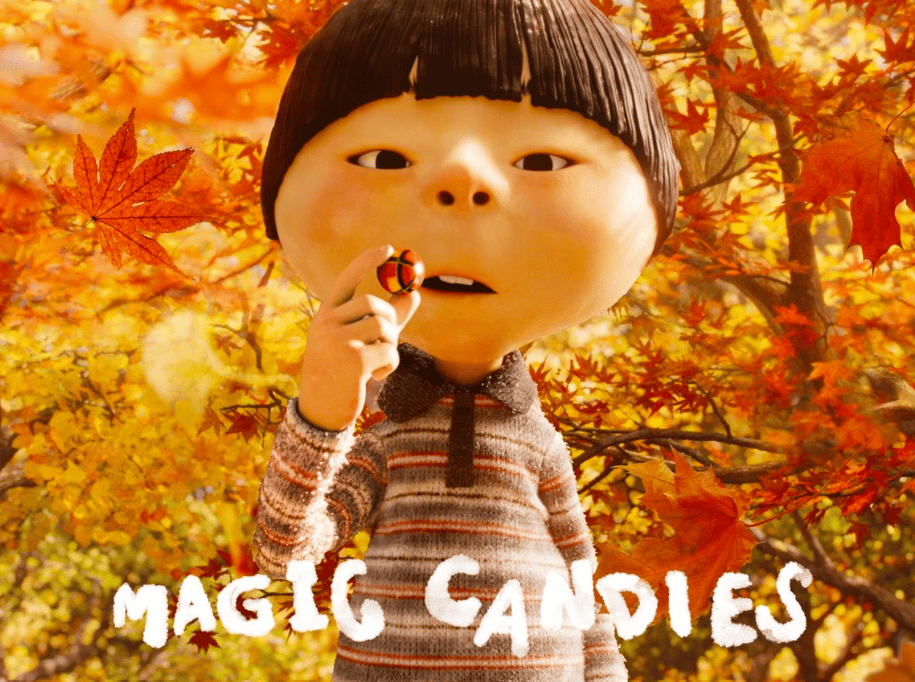
Credit: Toei Animation
Directed by Daisuke Nishio and written by Baek Hee-na. Starring Yoshifumi Hasegawa, Hiroshi Iwasaki, Haruto Shima, and Sakiko Uran. 21 minute Runtime. Japanese Language. 3.5⭐

Credit: Toei Animation
Dong-Dong is an introverted young boy who spends his time playing with marbles and his elderly dog Gusuri rather than engaging with peers. On his way home one day, he buys a pack of strange candies at a convenience store. These candies allow him to hear the hidden voices around him, including that of his home’s furniture, Gusuri, and his father’s inner monologue. From these voices, Dong-Dong gains greater insight into the world around him and his place within it.
For a short focused on voices, this is a short that often sits in silence. Dong-Dong lacks the social skills and graces to truly engage with the voices that he hears. Sadly, this contributes to a lack of dynamism within the narrative. The candies last only a short time, meaning that aside from a few exceptions, the conversations lack the depth to really impart meaningful lessons to our young hero. This makes the changes that do occur feel somewhat contrived. This is a shame, because the environmental storytelling and creativity within this short are playing with interesting ideas.
The short cleverly shows without overly explaining that Dong-Dong has dealt with grief, loss, and absence, and that colors how he approaches other relationships. The voices enter each scene in consistently unique ways, with it never being entirely clear who or where the next voice will come from or how. There’s fun physicality to the animation and how different intangibles are made physical. Finally, the art is incredibly distinctive. The people and objects don’t always look “good” but that’s not the intention. They feel solid, real, and vibrant. The animation flows in a way that is both fluid and stilted, in a way that complements the story. I wish the core narrative had hooked me just a bit more, because all the pillars supporting it were very well done. If anything, this short was hurt by being slightly too long, and tighter pacing could have eased some of these troubles. I hope this team takes this success and builds upon it to create something even more engaging.
In the Shadow of the Cypress
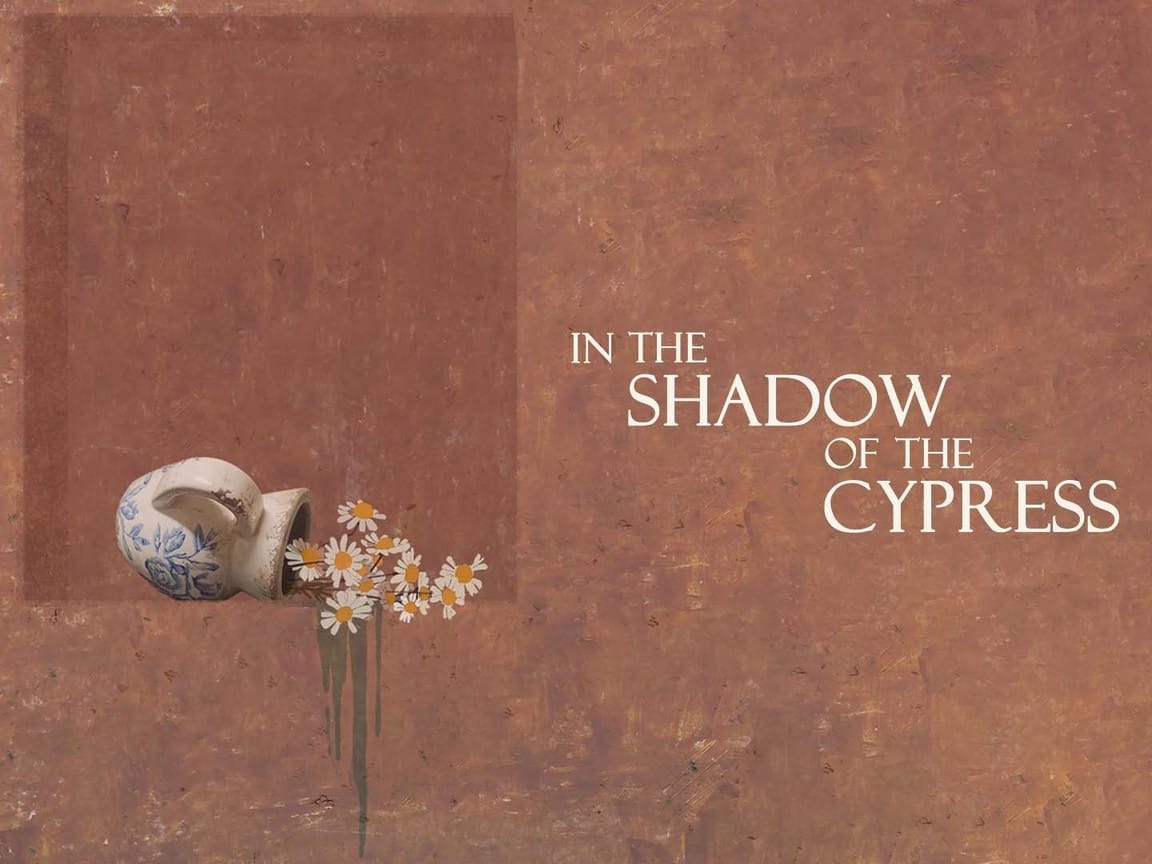
Credit: Barfak Animation
Directed by Hossein Molayemi and Shirin Sohani. 20 minute runtime. 4.5⭐
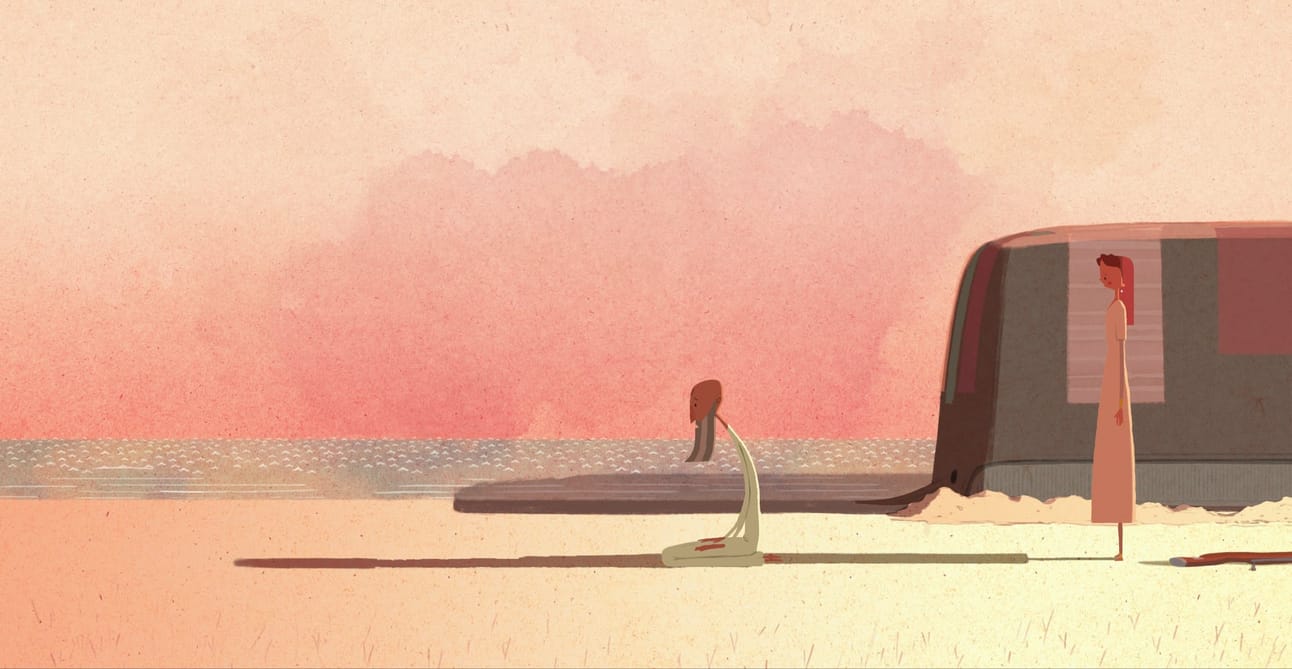
Credit: Barfak Animation
A sea captain and his daughter live in isolation following a tragedy in their past. The Captain struggles with PTSD, lashing out at the world around him, leading the Daughter to leave their home. However, just as she begins to leave, she discovers a beached whale on their doorstep. As she and the captain attempt to save the whale, their personalities and values continue to clash.
This was an absolutely beautiful work, both in the art and the narrative, brought together by an impressive Iranian team. The Captain is so consumed by his own grief and trauma that he fails to understand how his daughter is grappling with the same emotions, or to see that his actions and selfishness simply serve to further strain their relationship. The Whale serves as the embodiment of their struggles, the impossibly large barrier between them that refuses to go away. The Captain and the Daughter take extremely different approaches to how they want to deal with the whale. While the Daughter is consistently caring and doing whatever she can to aid and comfort the whale, the Captain fluctuates between radical extremes. He can be caring, cold, angry, erratic, or apathetic, and he fluctuates between these emotions rapidly, leading him to increasingly drastic choices to resolve the situation. All this is aided by an airy, pastel art style and vibrant animation. Despite a total absence of dialogue, the expressiveness of the characters manages to convey everything that is needed. The short also utilizes specific animations techniques to convey emotions, such as seeing a character melt into a puddle or shatter like glass. Color is important throughout and the brightness of the palette helps the themes from feeling too heavy, while the themes that go dark literally and figuratively are made more impactful by this contrast. The story is left somewhat ambiguous, but in a good way that allows for discussion on the narrative and themes without leaving anything feeling unresolved. I think this short is a hair’s breadth away from being an absolute timeless masterpiece, and if this team has the chance to create a larger narrative, I have no doubt they can get there. Of all these films, this is the one to seek out.
Yuck!
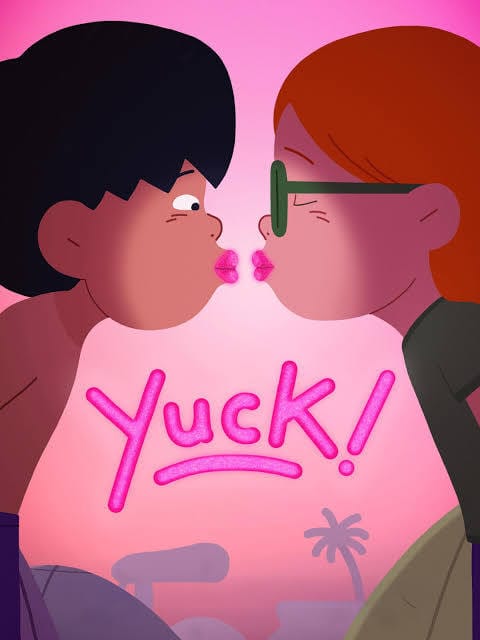
Credit: Ikki Films
Directed and Written by Loïc Espuche. Starring Noé Chabbat, Katell Varvat, Enzo Desmedt, Camille Bouisson, and Hugo Chauve. 13 minute runtime. French language. 4⭐
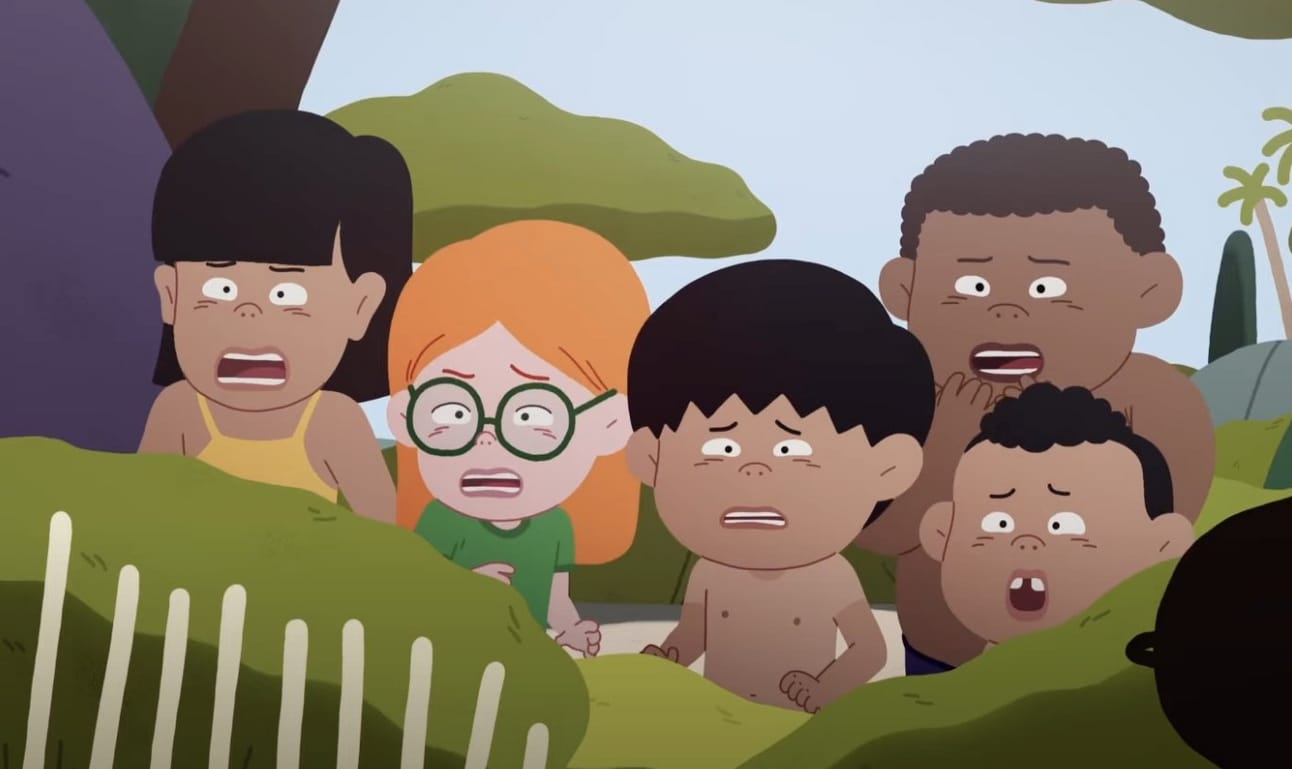
Credit: Ikki Films
Leo is spending the summer at a campground with his family. Leo, his siblings, and their friend Lucie enjoy playing around the campground and spying on adults expressing affection. Enthralled and disgusted by this behavior, especially any sort of kissing, Leo and the kids enjoy laughing and mocking the “perverted” behaviors of teens and adults. However, Leo begins to struggle with his own budding affection for Lucie, exacerbated by the fact that in this world, lips grow pink when individuals feel love or infatuation.
This was such a sweet little story. It’s a great encapsulation of that strange part of puberty where children are developing at different speeds. The social peer pressures insists on viewing any sort of physical affection as gross, and Leo and the kids view themselves above this sort of base behavior. It’s jarring to hear the kids talk about perverts, but I’ve also heard enough conversations about cooties to understand how prevalent these puritanical mindsets are. The film is extremely varied in the ages and body types of various characters, and it’s not necessarily trying to have any of them look “good” until the moment their eyes and lips light with the power of love.
The way that the kids try to villainize and pathologize this behavior is both funny and fascinating, but the short isn’t afraid to shy away from how this seemingly harmless behavior can quickly turn toxic and lead to real issues for how people perceive themselves and society in a way that feels incredibly prescient. The short manages to wrap things up rather neatly, and I wish there had been just slightly more room for the story to work with to give things some story beats more room to breathe. Even so, it’s a sweet little film about crushes and first love, and if anything, left me thinking about how the world could use a few more public displays of unabashed affection. Probably for the best that our lips don’t start glowing though.
Wander to Wonder
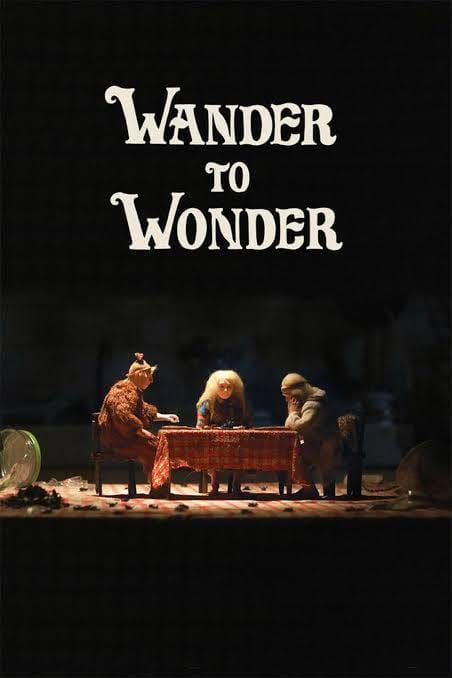
Credit: Nina Gantz
Directed and written by Nina Gantz. Starring Neil Salvage, Toby Jones, Amanda Lawrence, and Terence Dunn. 14 Minute Runtime. English Language. 3.5⭐
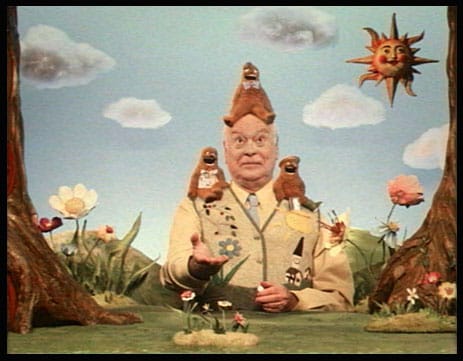
Credit: Nina Gantz
Littlepeople Mary, Billybudd, and Fumbleton used to be the stars of the children’s television program, Wander to Wonder, with the creator and host of the program, Uncle Gilly. After Uncle Gilly unexpectedly passes away in their home studio, the trio must do their best to survive in a world that is treacherous and confusing to them.
I think this short expertly accomplished what it set out to do, and also that it firmly is not for me. This is a deeply unsettling short that borders on being a horror. Throughout the film, Uncle Gilly’s corpse continues to rot in the corner as the Littlepeople try to sort through their grief, as well as the fact that Uncle Gilly left them entirely unprepared for this eventuality. One of the characters, Mary, is fixated on the program, insisting that Billybudd and Fumbleton help her continue to film new episodes, and seemingly believing that she’s still broadcasting out to their loyal audience. While Mary is the focal point, Billybudd and Fumbleton are also struggling, with Fumbleton becoming increasingly detached from reality, reciting lines from plays and exposing himself to his fellows, while the childish, fumbling Billybudd seems drawn to whatever will provide him with the most stimulus. There’s a feeling that the Littlepeople are somehow cognitively delayed, but I can’t determine if that’s innate or simply due to a lack of education. Even when the short flashes back to their time with Uncle Gilly, there’s an air of menace that is hard to dispel.
I appreciated seeing how the trio attempt to deal with their de facto imprisonment, while feeling sorrow over how they seem to have been exploited. The ending left me feeling extremely unsatisfied in ways that I don’t want to delve into for fear of spoiling things, but I was left wishing that this was a longer piece that had more opportunity to delve into the ideas that were only touched on here. The art is interesting but off putting, a choice that’s certainly deliberate given the tone. The inspiration from Fred Rogers is evident, and I thought that this aesthetic was captured quite brilliantly. However, the transition from set to home was somewhat less well realized, and it never actually felt like a lived in space to me. All in all, I was just left wanting more, but at the same time grateful that there wasn’t any more given how this short made my skin crawl.
Beautiful Men
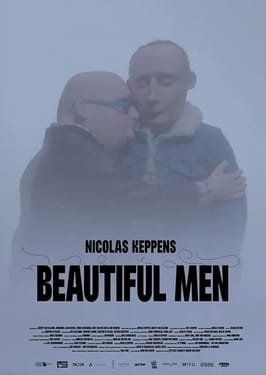
Credit: Animal Tank
Directed and Written by Nicolas Keppens. Released 2023. Starring Peter Van den Begin, Peter de Graef, and Tom Dewispelaere. 19 minute runtime. Dutch Language. 3.5⭐
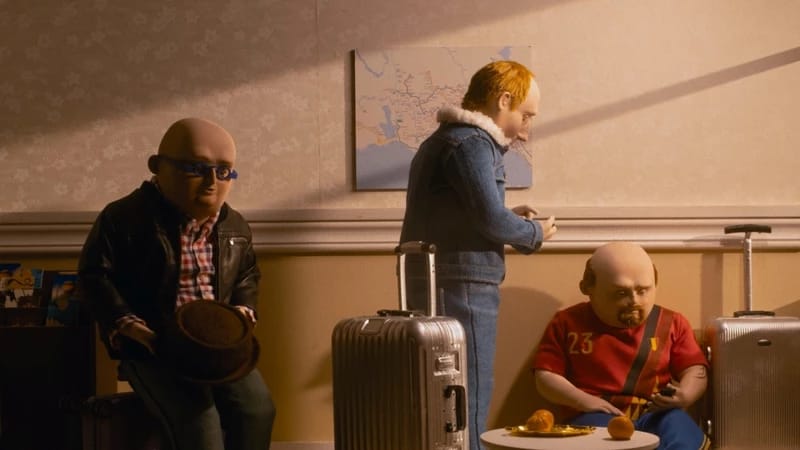
Credit: Animal Tank
Brothers Steven, Bart, and Koen travel to Turkey together to get hair transplants. Upon arrival, Steven, who scheduled the procedures, learns that he mistakenly scheduled only a single procedure. As Steven grapples with this mistake and how to fix things, he and his brothers have to work through their relationship and the unique ways each man struggles with masculinity.
This is another film where I think it did exactly what it set out to do, but I didn’t enjoy it. The movie is circling around something I would find extremely interesting, but the length just does not provide the room necessary to engage in the themes meaningfully. Each of the brothers is having a crisis of masculinity, but in a unique way. As a character states at the start of the film, these men are clearly trying to solve these deeper seated issues by getting themselves some hair. Steven, the brother with the most hair, seems burdened by appearing to be the most successful. However, in reality he is a nervous wreck barely hanging on and burdened by his failure to properly schedule the appointments. Bart is the classic man who expresses his insecurity as anger, and he has a deep seated fear that his marriage is falling apart because his masculinity is failing. Koen outwardly presents as the most put together despite being the only one completely bald, yet when the others leave the frame, the audience is able to see that Koen is also deeply insecure about his appearance and the fact that he is single.
All of these are interesting dynamics, and the way the brothers balance the tenderness they feel towards one another with these insecurities is interesting to watch. The animation here is off putting in a way that feels intentional. Everything moves stiltedly, the screen is often partially obscured in haze whether that be because of fog, steam, or smoke. This idea that brothers can’t see the real problems in their lives due to a haze deceiving them is a clever enough environmental conceit, but I just desperately wanted there to be some tension, some confrontation, that brought these themes to a boil. Instead the short leaves many of these tensions unresolved, and I couldn’t help but feel dissatisfied by this even if it is thematically appropriate.
And those were the Oscar nominated animated shorts for 2025. If you have the opportunity, I definitely recommend seeing them, but particularly In the Shadow of the Cypress. Short fiction, and especially short films, are incredibly difficult to nail, and I think all of these films are good art even if I didn’t end up enjoying all of them. I’m not looking to rehash the concerns that I listed earlier, but I really do hope that garnering awards buzz for these shorts enables the directors and crews of these films the opportunity to take on more projects in the future. They all took pretty interesting and creative swings in ways that really utilized animation well. Shorts are the perfect place to take experimental and weird swings, and I’d love to see some of these techniques make there way into feature films.
That’s all for this week. Next week you’ll be getting my recap and recommendations from February while I continue working on my Reacher piece. Stay tuned and take care of yourselves.
Soma